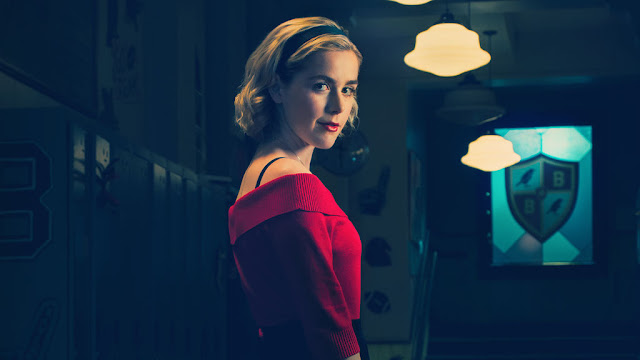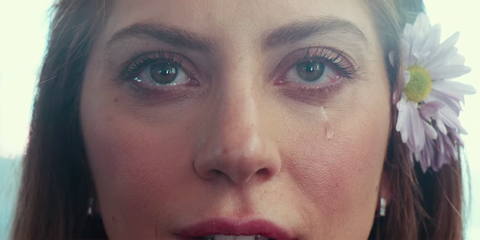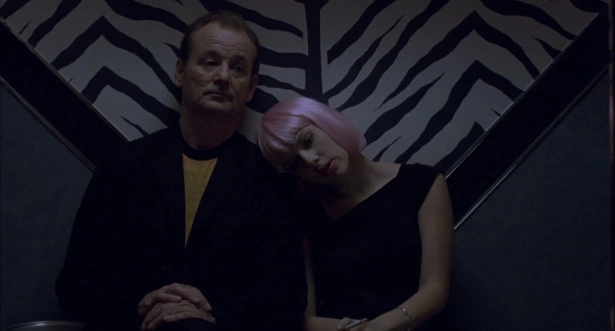Chilling Adventures of Sabrina and Religion: A Discussion of the First Three Episodes
Kiernan Shipka in Chilling Adventures of Sabrina
On October 26th, the Netflix title Chilling Adventures of Sabrina premiered, just in time for Halloween, in all of its satanic and bewitching glory. While I have not finished the series, I have opted instead to review the show in three episode chunks, and man are these three episodes a wild broom ride from start to finish. One of the biggest themes that is supposed to be present throughout the series is questioning and challenging religious traditions, and I’ve never felt more at home with this idea.
Many pieces of media have characters questioning religion, their place in the world, the meaning of life, and everything that churches and organizations say any deity can answer. Over the weekend I read (well, listened to) The Stranger by Albert Camus, which has a consistent theme of questioning religion and worship in general, culminating in a speech with the main character narrating "... what did his God or the lives people choose or the fate they think they elect matter to me when we're all elected to the same fate..." Sabrina Spellman's (Kiernan Shipka) questioning does not culminate in a long speech, but in an act of rebellion: running away.
On Sabrina's sixteenth birthday, fittingly on October 31st, she is to complete her dark baptism, a ritual in which she picks more names, signs her name in the Dark Lord's book, and becomes a full-time witch, forced to leave her mortal life behind. This witch rite of passage leaves Sabrina conflicted, as she loves her caring boyfriend Harvey (Ross Lynch), her friends, the activist Rosalind (Jaz Sinclair) and the non-conforming Susie (Lachlan Watson), and the mortal life she lives; but, she loves her powers, her aunts and cousin, and wants to make her deceased parents proud. It's a choice that she is told all witches make easily, as Satan's religion is one of the always appealing free will, one where Sabrina can use her powers for herself and make her own decisions. We learn through her first conversation with Father Blackwood (Richard Coyle), the high priest of their religion, that a lack of free will is what scared Sabrina the most, something that her patriarchal school system actively reinforces.
However, she soon learns that this is not the case in Chapter 2, where Sabrina actually reaches the dark baptism under the blood moon on her birthday. After her and Father Blackwood's persuasive conversation, Sabrina makes the choice to become a full-time witch, but not without spending Halloween with her friends. It's a wonderful scene, one that has Sabrina with those that truly appreciate her and find beauty in her actions. The dark baptism, however, is dark and isolating, the warmth of her friends gone and replaced with the judgement of her future. At the baptism, she begins to understand visions given to her by a magical apple (which I cannot remember the name of) in Chapter 1. She had asked this apple about her fate, only to be met with visions of a hellish landscape of witches hanging and Satan himself approaching her. It's absolutely terrifying, so when Blackwood tries to force her hand to sign the book, she runs.
Fleeing, however cowardly it may seem, is still an act of agency, one that would be denied had she signed that book. That act of agency leads to her aunts feeling ashamed and embarrassed, but what they, or rather Zelda (Miranda Otto), fail to realize is that Sabrina is acting more in line with Satan’s gospel than he wants. And all of this is what makes this such a good representation of questioning faith, especially as a teen: realizing that the gospels you are supposed to follow can be hypocritical, and that instead leaders want you to follow the convenient truths rather than true teachings.
Sabrina’s questioning is further complicated in Chapter 3, in which she is put on trial for breach of promise for refusing to sign Satan’s book despite promising to do so (spoiler: she herself didn’t make this promise). The episode takes a strong stance against automatically assigning religions to children, as the teachings are much too complicated for them to understand, like Sabrina, and doing so takes away their agency right when they are born. It is revealed that only days after her birth, Sabrina’s father and Aunt Zelda signed her name in Satan’s book, an act that essentially sold her soul, technically meaning she had breached her promise. Except she didn’t, as the day before her mother and Aunt Hilda had a Catholic baptism for her, tying her to another faith that preaches beliefs but does not always follow them.
This mixed religious background, and in turn mixed-race background, makes Sabrina so conflicted as to what she should believe that she chooses another path, living as witch and mortal, without one faith or the other. I do not think the show is specifically advocating for atheism or to follow a specific religion, but to simply show what religion can feel like for children. Camus’s character is already an adult, one that has denounced religion and God and is sure in his philosophy and approach to life. But Sabrina is sixteen, living in two patriarchal worlds in which her agency is terrifying, and she herself is scared of her own faith. No one should fear their own idol, but blind worship, like that of Madame Satan (Michelle Gomez), is not the right approach to faith either, as both relinquish agency to a deity that cannot be truly comprehended.
Chilling Adventures of Sabrina wants its audience to know that being unsure of one’s faith is fine. To choose one’s own path, one that questions religion and society, is perfectly acceptable to do as a teen, and it’s acceptable to not understand the faith those around you force you to be a part of.
Sabrina is not God-fearing or blindly worshiping, she is simply her smart, witchy self, and I cannot wait to see what happens from here.
Thank you to my Patrons:
Ben Bird Person
Twitter: https://twitter.com/meganro1110
Instagram: https://www.instagram.com/meganr1110/



Comments
Post a Comment